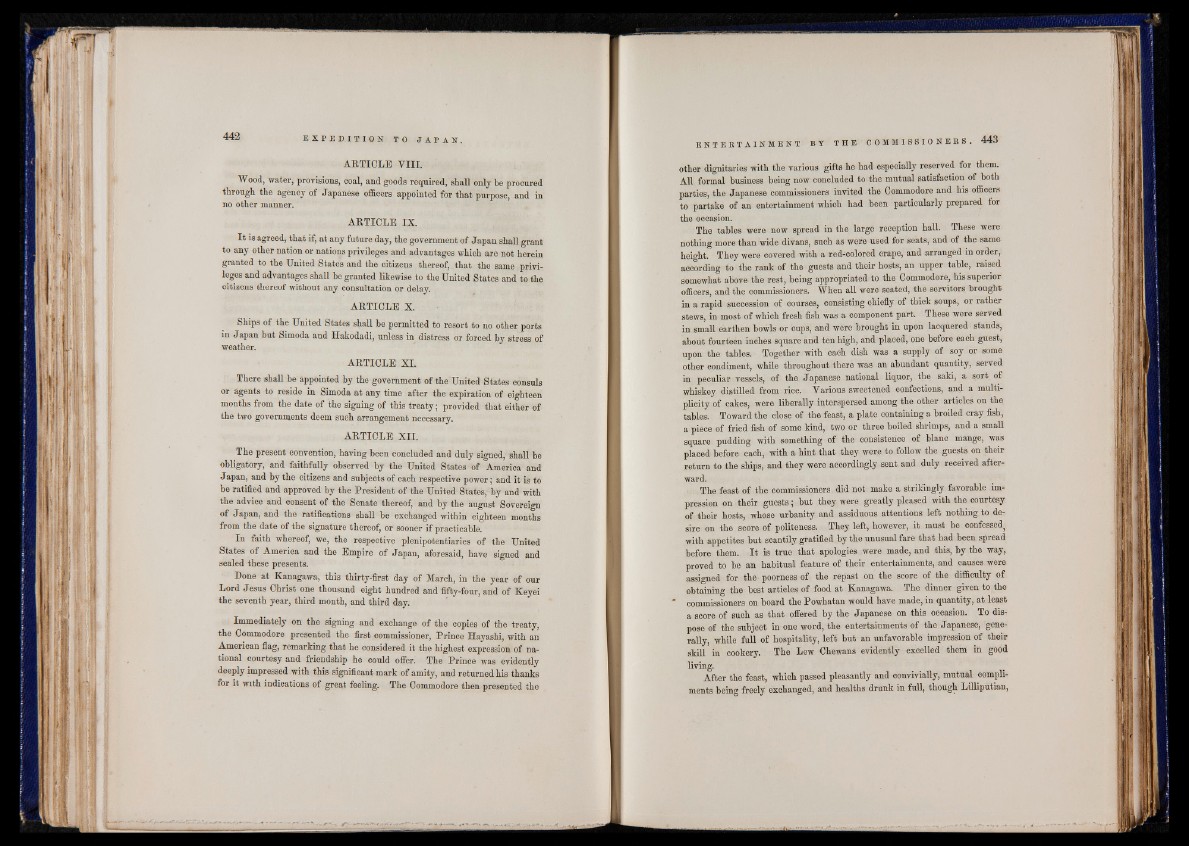
ARTICLE YIII.
Wood, water, provisions, coal, and goods required, shall only he procured
through the agency of Japanese officers appointed for that purpose, and in
no other manner.
ARTICLE IX.
I t is agreed, that if, at any future day, the government of Japan shall grant
to any other nation or nations privileges and advantages which are not herein
granted to the United States and the citizens thereof, that the same privileges
and advantages shall he granted likewise to the United States and to the
citizens thereof without any consultation or delay.
ARTICLE X.
Ships of the United States shall he permitted to resort to no other ports
in Japan but Simoda and Hakodadi, unless in distress or forced by stress of
weather.
ARTICLE XI.
There shall be appointed by the government of the United States consuls
or agents to reside in Simoda at any time after the expiration of eighteen
months from the date of the signing of this treaty; provided that either of
the two governments deem such arrangement necessary.
ARTICLE XII.
The present convention, having been concluded and duly signed, shall he
obligatory, and faithfully observed by the United States of America and
Japan, and by the citizens and subjects of each respective power; and it is to
be ratified and approved by the President of the United States, by and with
the advice and consent of the Senate thereof, and by the august Sovereign
of Japan, and the ratifications shall be exchanged within eighteen months
from the date of the signature thereof, or sooner if practicable.
In faith whereof, we, the respective plenipotentiaries of the United
States of America and the Empire of Japan, aforesaid, have signed and
sealed these presents.
Hone at Kanagawa, this thirty-first day of March, in the year of our
Lord Jesus Christ one thousand eight hundred and fifty-four, and of Keyei
the seventh year, third month, and third day.
Immediately on the signing and exchange of the copies of the treaty,
the Commodore presented the first commissioner, Prince Hayashi, with an
American flag, remarking that he considered it the highest expression of national
courtesy and friendship he could offer. The Prince was evidently
deeply impressed with this significant mark of amity, and returned his thanks
for it with indications of great feeling. The Commodore then presented the
other dignitaries with the various gifts he had especially reserved for them.
All formal business being now concluded to the mutual satisfaction of both
parties, the Japanese commissioners invited the Commodore and his officers
to partake of an entertainment which had been particularly prepared for
the occasion.
The tables were now spread in the large reception hall. These were
nothing more than wide divans, such as were used for seats, and of the same
height. They were covered with a red-colored erape, and arranged in order,
according to the rank of the guests and their hosts, an upper table, raised
somewhat above the rest, being appropriated to the Commodore, his superior
officers, and the commissioners. When all were seated, the servitors brought
in a rapid succession of courses, consisting chiefly of thick soups, or rather
stews, in most of which fresh fish was a component part. These were served
in small earthen bowls or cups, and were brought in upon lacquered stands,
about fourteen inches square and ten high, and placed, one before each guest,
upon the tables. Together with each dish was a supply of soy or some
other condiment, while throughout there was an abundant quantity, served
in peculiar vessels, of the Japanese national liquor, the saki, a sort of
whiskey distilled from rice. Various sweetened confections, and a multiplicity
of cakes, were liberally interspersed among the other articles on the
tables. Toward the close of the feast, a plate containing a broiled eray fish,
a piece of fried fish of some kind, two or three boiled shrimps, and a small
square pudding with something of the consistence of blanc mange, was
placed before each, with a hint that they were to follow the guests on their
return to the ships, and they were accordingly sent and duly received afterward.
The feast of the commissioners, did not make a strikingly favorable impression
on their guests; but they were greatly pleased with the courtesy
of their hosts, whose urbanity and assiduous attentions left nothing to desire
on the score of politeness. They left, however, it must be confessed^
with appetites but scantily gratified by the unusual fare that had been spread
before them. I t is true that apologies were made, and this, by the way,
proved to be an habitual feature of their entertainments, and causes were
assigned for the poorness of the repast on the score of the difficulty of
obtaining the best articles of food at Kanagawa. The dinner given to the
commissioners on board the Powhatan would have made, in quantity, at least
a score of such as that offered by the Japanese on this occasion. To dispose
of the subject in one word, the entertainments of the Japanese, generally,
while full of hospitality, left but an unfavorable impression of their
skill in cookery. The Lew Chewans evidently excelled them in good
living.
After the feast, which passed pleasantly and oonvivially, mutual compliments
being freely exchanged, and healths drunk in full, though Lilliputian,